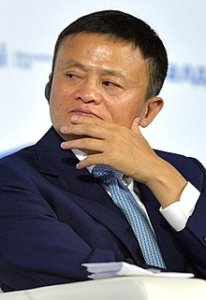Jack Ma and his vision on global trade
“We discussed a number of issues ranging from helping farmers to develop agricultural products, we discussed how we could support small businesses in the US sell to China and how to enhance the flow of trade between China and the USA. In the meeting we both stayed away from debating the accusation of china-trade manipulations” – Jack Ma, Founder, Alibaba

Leverate’s Adinah Brown details a r public interview with a representative from the World Economic Forum, which addressed a recent meeting with Donald Trump, along with various other topics of great interest, which echoes President Xi Jinping’s extensive efforts to design a Chinese model for global trade.
The entire dialog is from the perspective of Jack Ma, and gives a first-person overview of how this model can be instrumental to international business.
The Visionary Jack Ma
Founder of Alibaba, former high school teacher and failed small business owner, the enigmatic Jack Ma was Interviewed by the World Economic Forum on topics ranging from his visit with President Trump, China and USA relations, globalization, credit ratings, Hollywood and the ultimate importance of happiness and health.
A Chat with Trump
Jack Ma said recently “I was invited to visit Trump at his renowned towers to talk about trade between the USA and China, and I’m glad to say that it was much more productive than what I thought it would be.”
“We discussed a number of issues ranging from helping farmers to develop agricultural products, we discussed how we could support small businesses in the US sell to China and how to enhance the flow of trade between China and the USA. In the meeting we both stayed away from debating the accusation of china-trade manipulations” he said.
“We have our differences of opinion as to whether China is indeed a trade manipulator, but the focus of this conversation was how to help small businesses and farmers in the US Midwest to export into China.”
The Big Grey Elephant in Trump Towers – China-US Trade Relations
I think it’s a tough call to blame China for the USA’s debt crisis. Going back 30 years ago the USA outsourced manufacturing jobs to China and Mexico and service jobs to India.
These American international companies profited greatly from globalization, as this setup meant that their profit margins were enormous. When I was a young man I bought a Motorola beeper, which I thought was the height of technology at that time, for $250 whilst I was on a wage of $10 a month. The cost of manufacturing the chip was $8, so the profits that IBM, CISCO and all these international companies were making was enormous.
In fact, comparisons show that the profits each of these globalized companies were making was more than what was made by the four largest banks in China put together. Yet despite their market cap growing more than 100 times in the past 30 years, where did all the money go?
Over the past 30 years America has been engaged in 13 wars that cost them a combined $14.2 trillion. If they spent just a percentage of that money building up infrastructure, imagine the difference that would have made?
If instead they had a strategy that was focused on creating jobs, no matter how good or weak that strategy may have been, it would still have led to a positive investment that serves a national interest.
Where else did the money go? It went to Silicon Valley and Wall St. But in 2008 there was the global financial crisis and 19.2 trillion just suddenly got wiped-out and destroyed 34 million jobs internationally. What if instead that money went to developing jobs in America’s midwest? That could have changed matters drastically.
This is not about China stealing jobs from the USA, the problem lies in the internal strategy of how money is prioritized in the USA for their own national interests. Only now there is a backlash against globalization as increasingly more people are questioning its value.
I believe that globalization is a positive development, but it needs to be improved. Globalization needs to be inclusive, up to now it’s been controlled by 60,000 big companies who dominated the arena, but what if in the years to come it will include millions of companies, not all of them huge, but all of them taking advantage of the global market?
China’s Attitude towards Globalization
My own attitude towards globalization is that it needs to become more open and more inclusive. It’s not about having one leader tell us what to do, but the ability for business owners to partner together in order to successfully achieve mutual interests. Globalization should be available to the millions, where they should join in and prosper together.
For the first time in China’s history, President Xi made a numbered commitment of ten years, in which he expects China to be importing USD $8 trillion. China still has its exclusionist policies and it is still very far from perfect, but this statement is an indication that China is moving in the right direction, from exporting to importing, and becoming a leading global player.
China has grown so dramatically in the last few years because they have finally opened up to the rest of the world. Yet this is just the beginning, with Indications showing that Mr Xi will take this further and open China’s doors even more so.
What is the Electronic World Trade Platform (EWTP)?
It’s an idea that I developed in response to the WTO. The WTO is a great concept that basically joins together national leaders, all with diverse interests, who try to organize trade agreements. But never have I seen this work because there is always so much disagreement.
In contrast, the EWTP is for business owners to come together and develop plans and strategies that are mutually beneficial. This idea is that business should be decided on by business people.
The platform enables young people and small business owners, who through the use of their mobile phones and the internet, are able to sell on a global scale. While the WTO came from government to business, this in contrast, is where like-minded business people come together and agree what objectives they would like met and have those programs than endorsed by the government.
Amazon Vs Alibaba
In comparison to Amazon, who owns all their assets and sells it on, Alibaba owns nothing and merely offers the infrastructure through which businesses can sell their products. If you are going to ask me which model is right or wrong, there is no answer to that because the world is never that simple and both models are needed.
But I do believe in the structural difference of Alibaba. While Amazon is an empire that buys and sells, Alibaba is more of an ecosystem that empowers others to sell and provide a service. Our technological innovation has provided 10 million or so small sellers with the means through which they can compete with tech monoliths like Microsoft and IBM. My aspiration is that with our technology and innovation we can potentially make every company like Amazon.
Alibaba could never be like Amazon, to hire people for delivery alone, would involve recruiting and managing 5 million people. As it stands we are a company of less than 50,000 people, so the organizational structure for something like that would be enormous and extremely costly. Instead, what we do is empower companies to provide the service and logistics. We support them to ensure that they are efficient, that they can make money and hire more people.
Progress is slow, but sure
Because Alibaba doesn’t own the supply chain, a common critique that we receive is that this compromises our ability to guarantee the quality of services. But, the way I see it, is that because I don’t own the supply chain, it is Alibaba’s role to support those who do. Ten years ago, it took 12 days to deliver a product from Shengzhou to Mongolia, now it only takes you several hours. This is huge progress.
Development is slow but you have to be patient because it is happening. Within one day alone we had 125 cities deliver products to locations throughout the world. We sold $17 billion in 11 days and delivered 600 million packages within 3 days. My dream is to make the technology and infrastructure inclusive so that every small company can use it.
I started my first business in China in 1992, where it took me 3 months to borrow $US5,000 from a bank and even then I eventually failed. It was just so difficult. But today with technology my aim is to empower these small businesses.
Crediting the Unbanked
One of the amazing things that I think Alibaba has achieved, is that we have figured out a way to provide financial credit to those with no banking history and therefore no credit history.
While only now, has AI gotten so big, the truth is for the past 17 years since the beginning of Alibaba, we have essentially been a data company, collected data from our buyers, sellers, through our logistics and transactions.
Using this pool of big data we have found a way to collate and analyze the credit history of our users and issue them with a credit rating based on their behavior on our website.
All users are than issued with a sesame card which will have recorded if they have tried to sell fake products or tried to commit any sort of illegal activity. The sesame card is incredibly useful and there to be used, even if that is to check the history of boy your daughter brings home.
The H2 of Hollywood
Any business decision that we make needs to fulfill two criteria. The first, will it solve a social problem? The second, will it be successful in 10 years? Not a year or two, because than I would be skeptical as to why it would be so easy, but 10 years. Our decision to venture into Hollywood fulfilled both requirements.
We identified that the social benefit to making a Hollywood movie was the 2H approach of health and happiness, which is really what anybody wants more than anything else. In Chinese movies the heroes always die, but in Hollywood, they live and I want to make our heroes live.
I want our movies to give people inspiration. My own favorite movie was Forrest Gump, where the narrative of life is hard, challenges are constantly thrown your way, but ultimately it’s our dedication and perseverance that will enable us to achieve and therefore counts most of all.








